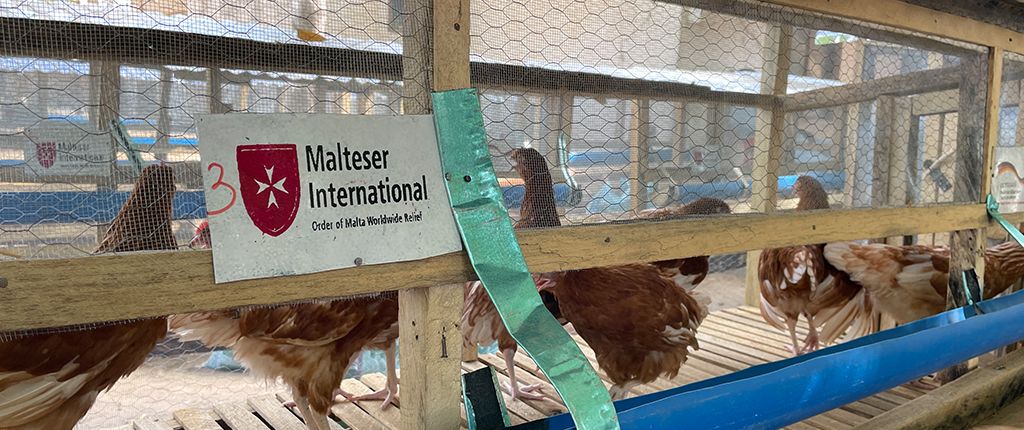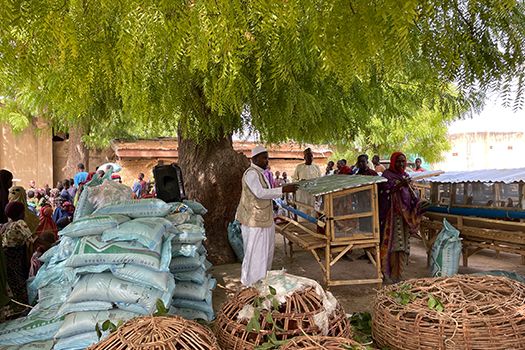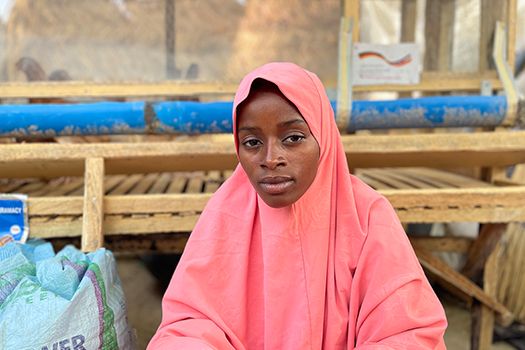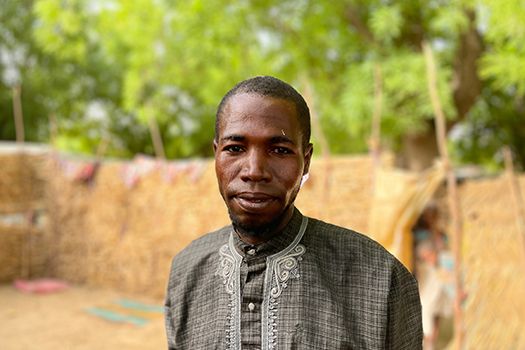
400 pullets for a village

There is a lot going on in the public square in Kirbiri. Around two hundred people are eagerly watching what is happening here today. The village chiefs sit in the shade and politely greet the staff of Malteser International. In the middle of the square are large, round, woven wooden cages in which young, slender pullets with brown feathers are pawing around. Two pickup trucks roll into the village along the dirt road, fully loaded with wooden battery cages. These are quickly unloaded at the side of the road next to the pullet. A little further on, sacks of animal feed stand in the shade. Small cards, the size of credit cards, lie on a table which will be given to the verified beneficiaries to receive the pullet kit. Names and numbers of the beneficiaries are written on them. Next to them is a list with photos of the people for the verification of beneficiaries to whom eight chickens per household will be distributed - 400 pullets in total, giving 50 households. The lists contain people who are classified as vulnerable using image-based community targeting. The employees worked closely with various social groups in the community to select the most vulnerable people who would receive this support.
“It was a lengthy process to identify the people who needed help the most. We first sat down with the most important groups and set selection criteria and chosen 10 people (5 male and 5 female) to form a committee. The committee was trained to select people according to humanitarian principles. It is always important to involve the communities so that there is no feeling of being forgotten,” says Ahmodu Bukar, who is responsible for this project at Malteser International.
Healthy nutrition

The pullet distribution is part of a project supported by the German Federal Foreign Office. “On the one hand, we want the families to have a healthy diet, and on the other hand, they can also generate a small income by selling the excess eggs,” says Aji Dahiru, Malteser International's program coordinator.
Ahmodu Bukar stands in front of the crowd that has now gathered and begins to explain: How do you open the coop or cage? How do you put food in the feeder? How do you put water in the waterer, and how do you isolate a pullet when it gets sick?
24-year-old Habiba Yawu also listens to the explanations. She has waited so long for this day. Eight young pullet will be hers from today that she could not have afforded herself. It is the first time that Habiba will own such pullet. She has not learned a trade and can neither read nor write, which does not leave her with many opportunities to earn a living in Kirbiri. Owning her own pullets is an opportunity for her. But before a woman like Habiba, who has never owned her own chickens, can have them, she has to learn a lot, she explains. How do the chickens feel in the coop, what feed do they need and how can she recognize that they are sick?
“I participated in a workshop with Malteser International and they explained everything to me. I now know for example, if one of the chickens is sick, it will probably lose its feathers. And it will distance itself from the others and no longer eat or drink. Then I can contact Malteser International and get help,” says Habiba Yawu. After Bukar's introduction, she stands at the table, says her name, is taken off the list and can pick up her coop, including pullets and two bags of pullet feed and multivitamins. She takes the card with her which is proof that she has received the pullets from Malteser International, and contains the contact number to which she can address her complains and give feedback.
Four of her 14 siblings came to help her carry the 1.8-meter wooden coop with the pullet. Habiba lives with her parents, grandmother and siblings in several small mud houses. In the middle, they have laid mats on the floor where the women of the family are sewing. When Habiba and her siblings put the stable in the courtyard, the whole family is delighted. Habiba was born in Kirbiri, unlike many of her neighbors, such as BB Husseini, who lives just a few meters away.
Fair distribution for social peace

BB Husseini fled here nine and a half years ago, fleeing the terror of Boko Haram. “Since then, we no longer have any land that we can farm. We have nothing here. The terrorists came at night and attacked us again and again. At some point, they started killing the old people. That's when we realized we had to flee. We left at night, only the old people stayed. Shortly afterwards, I found out that they had all been killed. I was alone here for two months, then I found the rest of my family again. At the beginning I had nothing,” says BB. In his home village, just 10 kilometers from here, BB had a piece of land that he could farm. He is all the happier now that he has the chickens like his neighbor Habiba.
“It is very important for social peace that we not only support refugees, but also the host communities. Because even people who have lived here for generations often don't have much. Together with the village community, we look at who is in need, in which families there are malnourished children, a sure sign that there is not enough food available,” says Aji.
“The chicken distribution is now a pilot project for us. It is an important building block to support the nutritional situation of people who have had to flee the terrorists and for those who have welcomed them into their communities. We would like to expand this even further, but we are in urgent need of donations,” says Michael Steffen, Country Representative for Nigeria at Malteser International.
Eight young chickens cost around 35 euros in Nigeria. Not a large amount, but too much for many families who have little in Kirbiri.








